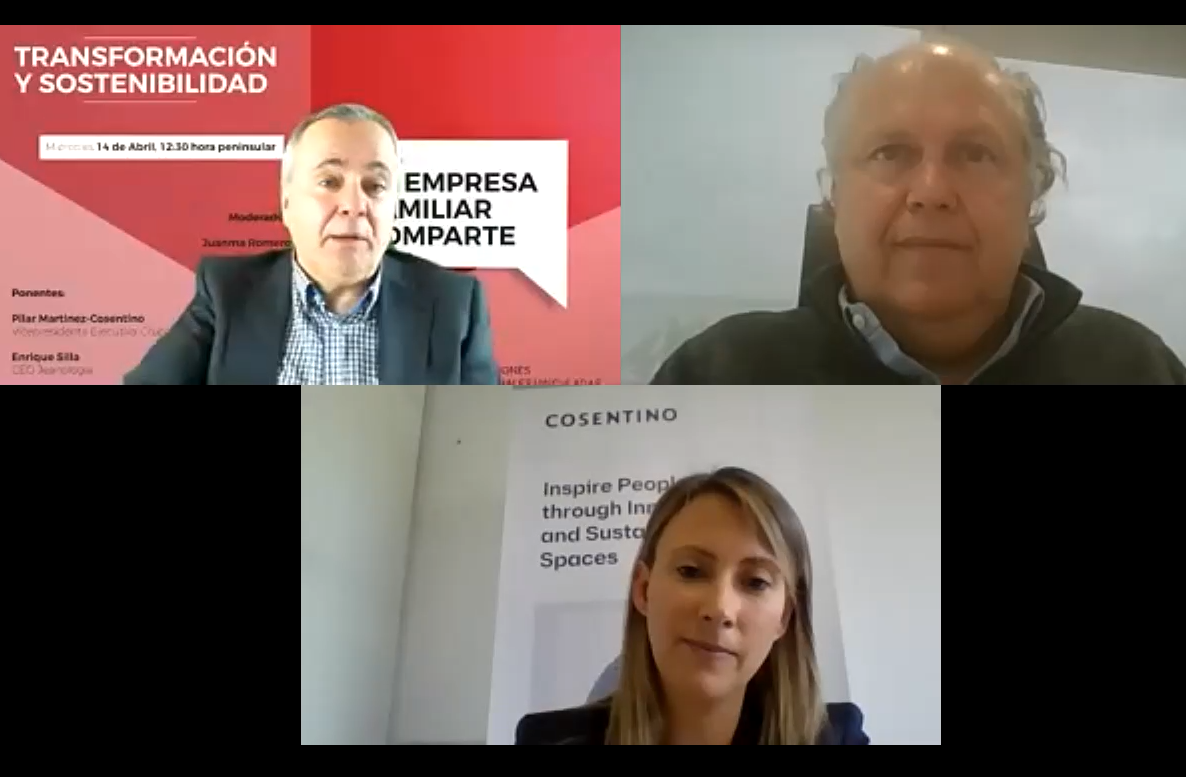Covid-19 has accelerated the family business transformation process towards sustainable models

Pilar Martínez-Cosentino, Executive Vice President of Grupo Cosentino, and Enrique Silla, CEO of Jeanología, attend the session “Transformation and Sustainability” from the series “The Family Business Shares”, organized by Family Business Territorial Associations.
Family businesses asks the Public Administrative Bodies for regulatory frameworks that encourage investments and business activity and do not penalize them.
The Covid-19 pandemic has brought an acceleration of the family business transformation processes towards a more sustainable model and inherent values of this kind of companies, like long-term approach, hard work and commitment to families, employees and their surrounding environment. They have proved to be an important ally moving forward along this path.
This was made evident in the online session called “Transformation and Sustainability” organized by the Family Business Associations linked to the Family Business Institution, among them the Catalonian Family Business Association (ASCEF). The session was attended by Pilar Martínez-Cosentino, Vice President of the Grupo Cosentino and Enrique Silla, CEO of Jeanología, who were moderated by the journalist Juanma Romero.
Pilar Martínez-Cosentino leads a company from Almería that produces and distributes innovative surfaces for design and architecture, with 5000 employees around the world and export sales representing 92% of its total turnover; in her opinion, the concept of sustainability goes beyond taking care of the environment: “At Cosentino, we understand sustainability in a broad sense, as a way of preserving the company for the future making it valuable for the environment, the society and all stakeholders.”
In this same line, Enrique Silla offered his view that sustainability would mean the alignment of three aspects: the planet, people and returns. “Reaching the sustainability goal would only be possible through profitability“, asserted the CEO of Jeanología, a textile company from Valencia present in 22 countries with a 98% of turnover out of exports, which has also managed to lead the textile industry transformation with its ground-breaking technologies capable of increasing productivity and simultaneously reducing water and energy consumption.
In the opinion of both entrepreneurs, sustainability has become a key concept of the vision of competitiveness in the business. “We live in a world where the consumer is not willing to buy a product if, for its manufacture, natural resources are destroyed or if child labor force is used in the process,” stated Enrique Silla, who also said that “If companies are competitive in sustainability and social responsibility, they will gain the customer’s credibility and trust, being able to attract and retain talent.”
Public Administrative Bodies Should Encourage, Not Penalize
Meanwhile, Pilar Martínez-Cosentino, underscored the need for companies to make the trip to sustainability accompanied by the Public Administrative Bodies and by society in general. “If we want to take a leap forward as a society, and leave no one behind, we need to increase the companies’ competitiveness by adding talent, and for that, we need to promote dual career training programs and university studies that could meet the companies’ needs“. “Either we make a long-term plan for education in Spain or it will be difficult to evolve as a country“, he stated.
From the point of view of these two family entrepreneurs, the Public Administrative Bodies’ role in reaching this goal of increased business competitiveness involves the creation of regulatory frames that encourage investment and activity and do not penalize them. “We need incentives for job creation, R&D+i and internationalization; we need the Administrative Bodies to help us be more competitive. We, the companies, are part of the solution and as we are more competitive and profitable, we could better contribute to sustainability“, stated Martínez-Cosentino.
Enrique Silla spoke on that same line and asked Public Administrative Bodies for “less interventionism and to let management on the hands of companies“.
Regarding the lessons taken from the pandemic for family enterprises, both entrepreneurs agreed to underscore the resilience ability that has been sowed in entrepreneurs. “I think that we are now better prepared for an uncertain world; we have gained experience and agility to address new situations that could happen again in the future,” asserted Jeanología’s CEO. Pilar Martínez-Cosentino also made emphasis on a new management style that bets on more horizontal organizations capable of listening to customers: “We have reinvented ourselves and what comes after Covid will not be like anything we had before,” she pointed out.
In her view, the tools with which family companies will continue to lead job and welfare creation in society, will be that bet for sustainability directly connected to these organizations’ idiosyncrasy, which, to a considerable extent, is the result of a set of values deeply rooted in their hearts, like focusing on long-term approaches, family related values, hard work and commitment to employees, providers, customers and society.
However, in Pilar Matínez-Cosentino’s words, “family businesses should continue to struggle to gain size, not fearing inorganic growth through merging operations“, as Enrique Silla mentioned, and doubling down on communication “to show society the value of their main role, which is job and wealth creation.”
Series “The Family Business Shares”
The series “The Family Business Shares” is organized by the network of Family Business Territorial Associations, comprised of more than 1500 family enterprises leaders in their business activities. The purpose of this series is to share among all the members of the network of associations their experiences with Covid-19, their challenges while minimizing the pandemics’ aftermath, as well as to show the importance of family businesses for job and wealth creation in Spain.
You can access the video of the session through this link in the private area of the website.